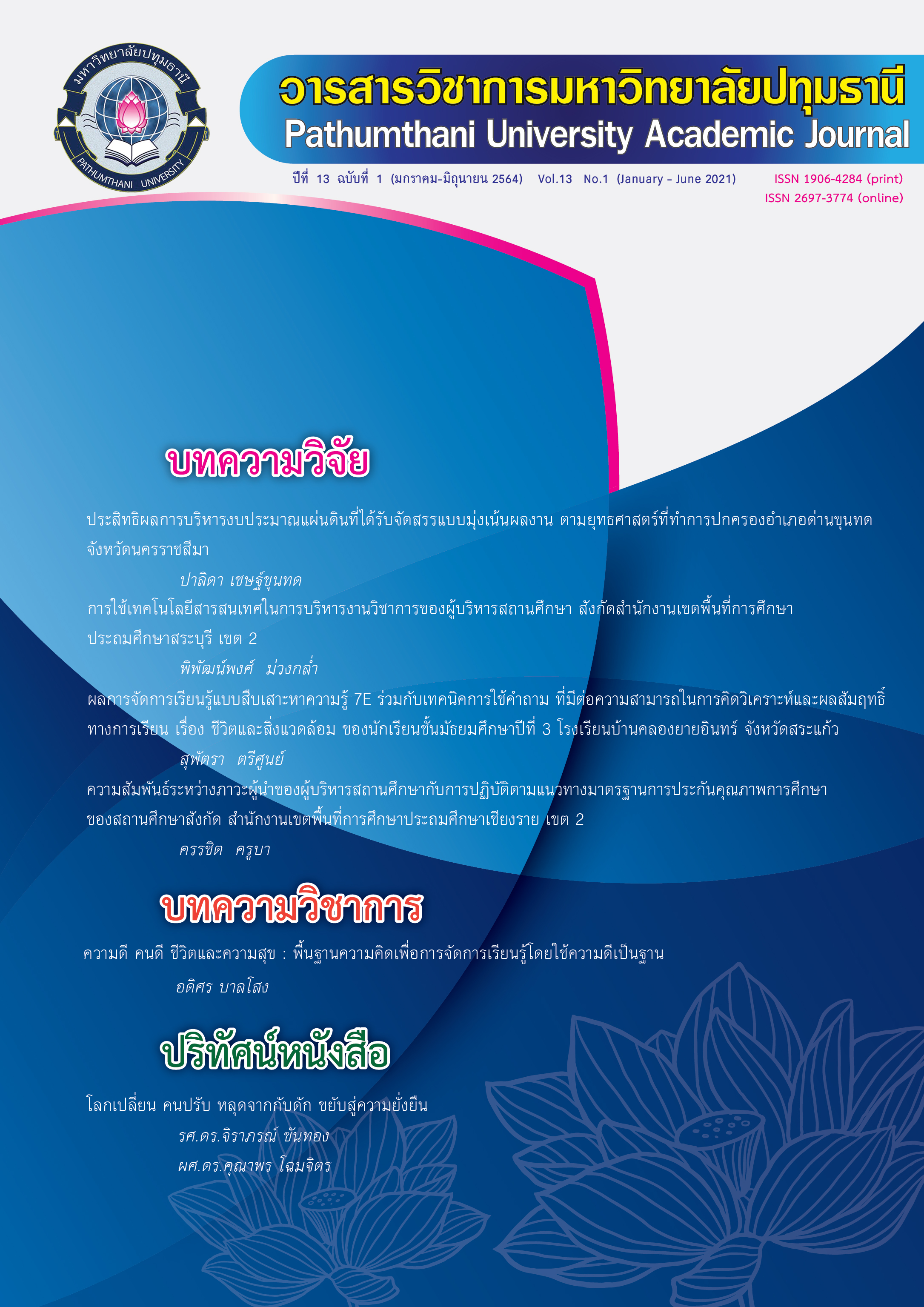MOTIVATION AND HYGIENE FACTORS AFFECTING PERFORMANCE EFFICIENCIES OF GOVERNMENT HOUSING BANK EMPLOYEES IN BANGKOK AND SURROUNDINGS AREAS
Keywords:
motivation factors, hygiene factors, Work Performance Efficiencies, Government Bank Housing PersonnelAbstract
The objectives of this research were 1) to study motivation factor and hygiene factors affecting performance of government housing bank employees in Bangkok and metropolitan, 2) to study efficiency of performance of government housing bank employees in Bangkok and metropolitan, 3) to analyze motivation factors and hygiene factors affecting performance efficiencies , 4) to examine problems and obstacles as well as ways to promote morale in work performance of government housing bank employees. This research used mixed methods. The conceptual framework of the study was created using Motivation factors and Hygiene factors of Frederick Herzberg, and Work Performance Efficiency of Graholm. The population of the study were 2,880 government housing bank employees working in various departments at headquarters and branches in Bangkok and metropolitan The sample size was determined using Taro Yamane formula, The sample were 400 government housing bank employees selected by simple random sampling and 8 department directors which were purposive selected for structured interview. The research instruments were questionnaire and interviews forms. The reliability of the questionnaire was .95. The statistics used were frequency, percentage, mean, standard deviation and stepwise multiple regression. The study results revealed that 1) level of motivation factors and hygiene factors affecting performance of government housing bank employees in Bangkok and metropolitan were at moderate level. When considering each aspect, motivation factors including the nature of work performance, respect, need for advancement, work success and job responsibilities were at moderate level. In terms of hygiene factors, namely compensation, welfare, job security, relationships with colleagues, supervision, policy and administration, and working conditions were at moderate level. 2) Efficiency performance of the government housing bank employee in Bangkok and metropolitan were at moderate level. When considering each aspect, showed that quantity of work, quality of work, knowledge and job skills, modern communication and supervision, creativity, and attitude were at moderate level. 3) The hypotheses tested showed that motivation factor mostly affected work performance efficiency especially work success and work progress at 51.9 % and 50.3 % respectively with statistically significant level of .05. For hygiene factors, there were two aspect that affected work performance included modern communication and work load which at 55.6 % and 52.5 % respectively with statistically significant level of .05. The overall of both motivation factors and hygiene factors affected work performance efficiency. 4) The problems and obstacles as well as ways to improve efficiency of work and created morale and morale of the government housing bank employees. According to interviewing 8 executives, their opinions on improving work efficiency included bank values on GIVE + 4 which consisted of good governance, innovative thinking, team work, excellent services, courage to change, achievement oriented, professionalism, working speed would support the efficiency of work performance.
References
เกียรติคุณ วรกุล. (2545). ความสัมพันธ์ระหว่างภาวะผู้นำ แรงจูงใจใฝ่สัมฤทธิ์ และผลการปฏิบัติงานของหัวหน้าระดับต้น ในโรงงานอุตสาหกรรมประกอบชิ้นส่วนอิเล็กทรอนิกส์. วิทยานิพนธ์ปริญญาวิทยาศาสตรมหาบัณฑิต สาขาวิชาจิตวิทยาอุตสาหกรรม. มหาวิทยาลัยเกษตรศาสตร์.
เกรียงศักดิ์ เขียวยิ่ง. (2550). การบริหารทรัพยากรมนุษย์. กรุงเทพมหานคร : เอ็กซเปอร์เน็ท.
ชลดา อักษรศิริวิทยา. (2559). ประสิทธิภาพในการปฏิบัติงานของพนักงานฝ่ายการเดินรถองค์การขนส่งมวลชนกรุงเทพ. กรุงเทพมหานคร. สารนิพนธ์ปริญญาศิลปะศาสตรมหาบัณฑิต สาขาวิชาการบริหารจัดการองค์การ. มหาวิทยาลัยเกริก.
ธนาคารอาคารสงเคราะห์. (2562). [ออนไลน์] เข้าถึงได้จาก : http://www.ghb.co.th.
ธีระชัย ไชยเมือง. (2557). ปัจจัยที่มีส่งผลต่อแรงจูงใจในการทำงานของพนักงานระดับปฏิบัติการ โรงแรมอิสตินแกรนด์สาทร. การค้นคว้าอิสระปริญญาบริหารธุรกิจมหาบัณฑิต. มหาวิทยาลัยเกษมบัณฑิต.
นวารา นาคเวก. (2555). การศึกษาสถานภาพของพนักงานราชการกับแรงจูงใจในการปฏิบัติงานให้มีประสิทธิภาพสำนักงานปลัดกระทรวงพาณิชย์. วิทยานิพนธ์ปริญญารัฐประศาสนศาสตรมหาบัณฑิต สาขาวิชารัฐประศาสนศาสตร์. มหาวิทยาลัยศิลปากร.
ปวีณรัตน์ สิงหภิวัฒน์. (2556). แรงจูงใจทีมีผลต่อประสิทธิภาพในการปฏิบัติงานของ บุคลากรในสังกัดอาชีวศึกษาจังหวัดลําปาง. การค้นคว้าอิสระปริญญาบริหารธุรกิจมหาบัณฑิต. มหาวิทยาลัยเนชั่น.
พัชรีญา วงศ์สุวรรศา. (2557). ปัจจัยที่มีผลต่อแรงจูงใจในการปฏิบัติงานของพนักงานระดับชั้นปฏิบัติการของสถานีโทรทัศน์ มหาวิทยาลัย U Channel. การค้นคว้าอิสระปริญญานิเทศศาสตรมหาบัณฑิต. มหาวิทยาลัยเกษมบัณฑิต.
วัชระ เลิศพงษ์วรพันธุ์. (2558). ปัจจัยที่มีอิทธิพลต่อการปฏิบัติงานของพนักงานฝ่ายบริการบุคลากรของบริษัทสายการบินแห่งหนึ่ง. วิทยานิพนธ์ปริญญารัฐประศาสนศาสตรมหาบัณฑิต. มหาวิทยาลัยเกษตรศาสตร์.
ศิริวรรณ เสรีรัตน์ และคณะ. (2545). องค์การและการจัดการ. กรุงเทพมหานคร : สำนักพิมพ์พัฒนาศึกษา.
สมพงศ์ เกษมสิน. (2550). การบริหาร. กรุงเทพมหานคร : ไทยวัฒนาพานิช.
สิทธิ์ ธีรสรณ์. (2550). แนวคิดพื้นฐานการวิจัย. กรุงเทพมหานคร : พริ้นท์ จุฬาลงกรณ์มหาวิทยาลัย.
สุพาณี สฤษฎ์วานิช. (2549). พฤติกรรมองค์การสมัยใหม่ : แนวคิดและทฤษฎี. กรุงเทพมหานคร : โรงพิมพ์มหาวิทยาลัยธรรมศาสตร์.
Granholm, A. R. 1988. Human Resource Director’s Portfolio of Personnel Forms, Records, and Reports. New Jersey : Prentice-Hall, Inc.
Krejcie, R. V. & Morgan, D. W. (1970). “Determining Sample Size for Research Activities”. Educational and Psychological Measurement, 30(3), pp. 607-610.
Herzberg, Frederick. (1959). The Motivation of Work. New York : John Wiley & Sons.
Yamane, T. (1973). Statistics : An Introductory Analysis. (3rd) New York : Harper and Row.
Downloads
Published
How to Cite
Issue
Section
License
บทความที่ได้รับการตีพิมพ์เป็นลิขสิทธิ์ของวารสารมหาวิทยาลัยปทุมธานี
ข้อความที่ปรากฎในบทความแต่ละเรื่อง เป็นความคิดเห็นส่วนตัวของผู้เขียน กองบรรณาธิการไม่จำเป็นต้องเห็นด้วยเสมอไป และไม่มีส่วนรับผิดชอบใด ๆ ถือเป็นความรับผิดชอบของผู้เขียนแต่เพียงผู้เดียว



